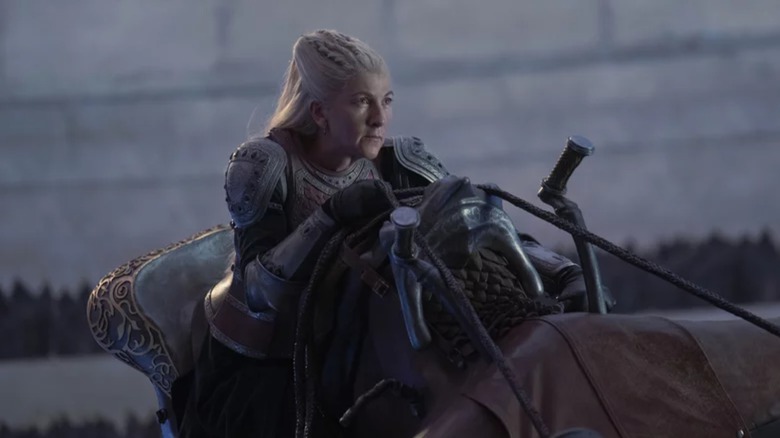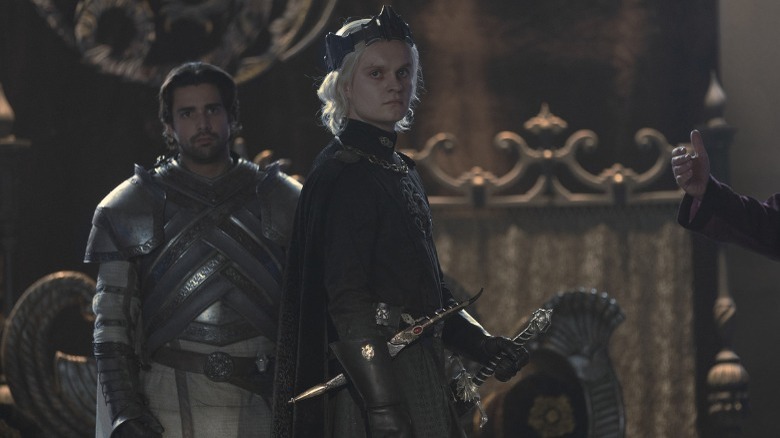House Of The Dragon Continues One Of The Great Game Of Thrones Traditions
Ned Stark's beheading. The Battle of the Blackwater. The Red Wedding. The Battle of the Bastards. It's a longstanding tradition in the world of "Game of Thrones" that if something huge is about to go down in Westeros, it won't happen in the season's premiere or finale, but in its penultimate episode. Episode nine of the season (or episode five or six, as the installments got fewer later in the show's run) is, quite frankly, almost always when the s*** hits the fan. This week, "House of the Dragon" clearly tried to continue the precedent its parent show started, but did it work?
Plenty of action unfolded on this week's episode of "House of the Dragon." In fact, despite the absence of some major players (I'm blowing a kiss in the direction of Dragonstone for Rhaenyra and Daemon), this was probably the most high-stakes episode of the show to date. The drama unfolds in the wake of King Viserys' (Paddy Considine) death, as Alicent (Olivia Cooke) discreetly spreads her misinterpretation of his last words and a frenzied search to find and crown Aegon (Tom Glynn-Carney) unfolds.
But when I look back on "The Green Council," I already know how I'll speak about it in shorthand: not as "the one where Aegon was crowned king," but as "the one where Eve Best's Rhaenys body slammed the halls of Dragonpit to make meaningful eye contact with her usurping family members." Okay, that's not exactly shorthand, but you get the drift. The episode's big moment comes at the very end, when Viserys' cousin terrorizes the gathered crowds in what looks to be an attempted assassination, only to back down at the last moment. This is an odd endnote, and I'm not sure it's one the story has earned yet.
The saga has a legacy of epic penultimate episodes
Another thing the world of "Game of Thrones" loves is punctuating seasons with big dragon moments, using the menacing creatures and their fiery temperaments as bookends for the very human conflict that's unfolding. Yet this moment felt much less earned than any of Daenerys' (Emilia Clarke) imposing shows of dragon-based power, or even Aemond's stolen dragon ride. There's a disconnect between the rest of the episode, which is quite propulsive, and this moment of dramatic inaction.
In HBO's post-episode commentary featurette, showrunners Ryan Condal and Miguel Sapochnik discussed the reasoning behind Rhaenys' interruption and inaction, with Condal saying that they "wanted a triumphal moment for her at the end of the season" since she's a powerful dragon rider. Sapochnik, though, shared some thoughts that made the scene sound a little more on the fly, saying, "We needed a penultimate scene, so we tried to come up with what's the worst thing that could possibly happen at the coronation and realized it was a dragon to be let loose."
Dragons don't always equal epic moments
With respect to everything this show has done so far — a lot of it is great! — the "we needed a scene" reasoning is a far cry from the hyper-intentional adaptations of George R.R. Martins' greatest story arcs that made up the penultimate episodes of most seasons of "Game of Thrones." Of course, it's not helpful to look at history with rose-colored glasses: not every episode nine of "Thrones" was a masterpiece, either. Season 5's "The Dance of Dragons" includes Dany's first dragon ride and the sacrifice of poor Shireen, but not much else of note. And "The Bells," the penultimate episode of the entire series, quickly became one the show's most polarizing chapters.
In the end, I simply think this story has been moving too fast for something as subtle as an act of restraint among a trio of characters who have barely shared screen time together to mean as much as writers hoped it did. Sapochnik says Rhaenys' "moral standpoint becomes the reason for inaction rather than action," and that's an interesting sentiment, but it also feels like the show had a dragon bust through a wall just to have a dragon bust through a wall.
"The Green Council" was intense, yes, but its most forced moment makes it no match for the legacy of grand penultimate episodes that "Game of Thrones" leaves behind.


